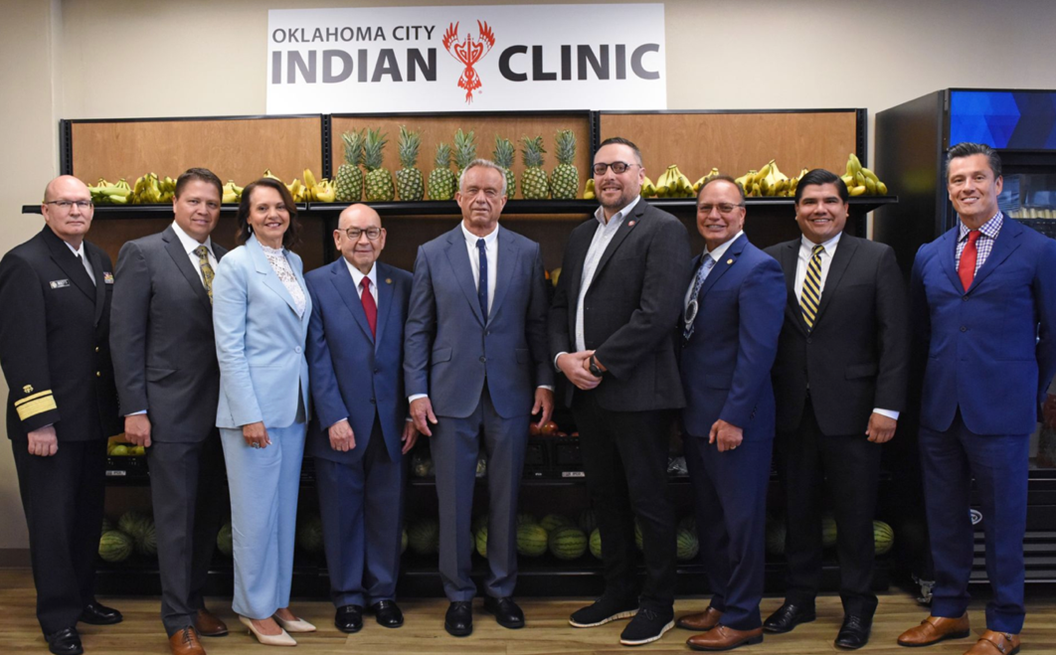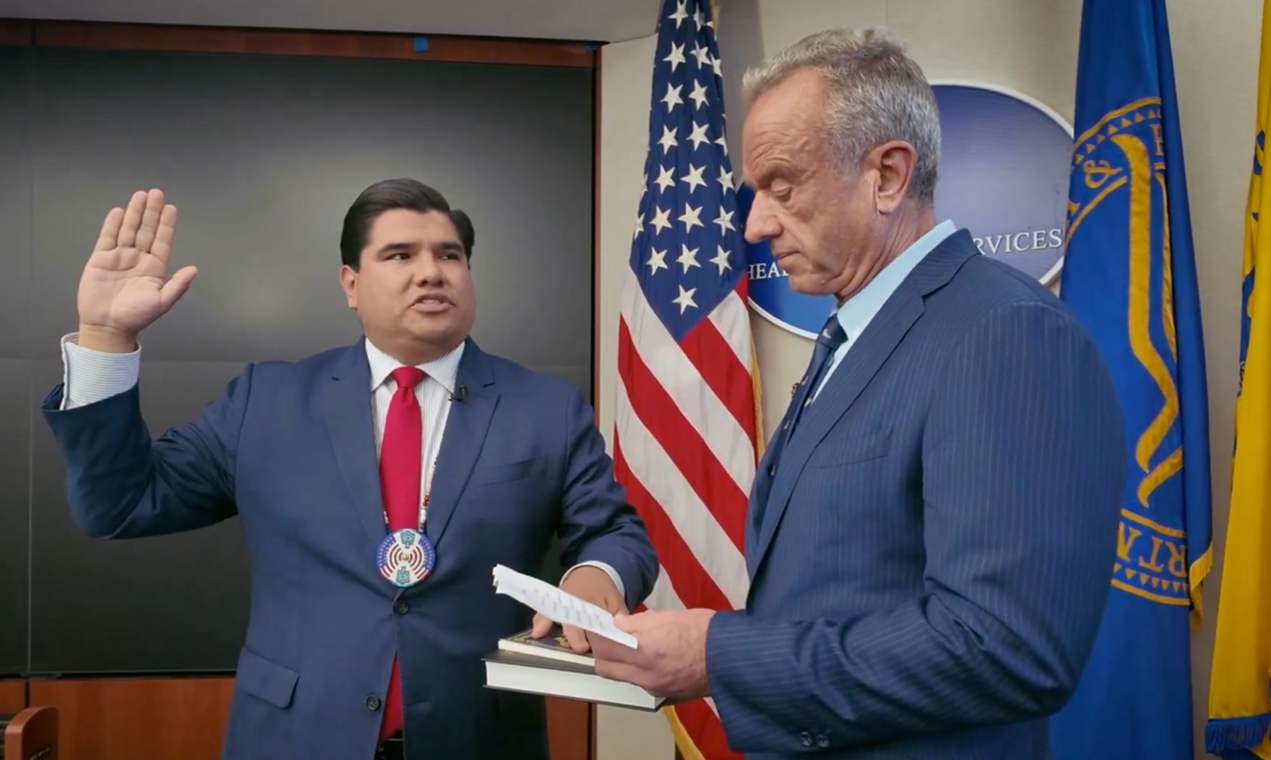
In this Edition:
📊 FY 2026 Budget: The President’s request funds IHS at $8.1 billion and Urban Indian Health at $90.4 million while omitting advance appropriations.
🏛 House Appropriations: At the Interior Subcommittee hearing, Reps. Simpson, Pingree, and Cole pledged to retain advance appropriations, with mark-ups set for June 23 and 26.
✉️ Native Caucus Letter: Members have until June 23 to sign the Native American Caucus letter urging protection of Tribal and Urban Indian programs.
⚖️ Reconciliation: Senate drafts keep the AI/AN Medicaid work-requirement exemption, but the SNAP exemption is absent and may be revived on the floor.
📝 NCUIH Advocacy: NCUIH submitted testimony to appropriators and circulated comment letters on SNAP and CMS waivers that defend AI/AN health protections.
🏥 IHS Consultations: Comments are open on EHR modernization and regional realignment, with an Urban Confer on July 28 and final comments due August 28.
🤝 NCAI Mid-Year: NCUIH President Walter Murillo co-chaired the Health Subcommittee as resolutions advanced priorities on Medicaid, IHS funding, and nutrition programs.
💡 Medicaid Guidance: HHS issued a memo directing states to align Medicaid payments with Medicare rates, trimming oversized state-directed payments.
📆 Save the Dates: OUIHP Executive Call (June 26), Monthly Policy Workgroup (July 16), IHS Virtual Urban Confer on IHS Proposed Realignment (July 28), and TTAG Quarterly Meeting (July 29-30).
Fiscal Year 2026 Budget Request and Appropriations

President’s Proposal: New Investments, No Advance Appropriations
The President proposes $8.1 billion dollars for the Indian Health Service and $90.4 million dollars for Urban Indian Health, with new investments in diabetes care, behavioral health, and disease-prevention initiatives, but without advance appropriations.
Key Indian Country Provisions
- IHS: $8.1 Billion – Minor increase but largely flat.
- Urban Indian Health: $90.4 million – flat funded
- Advance appropriations not included, despite the inclusion for FY 2026 in the FY 2025 continuing resolution.
- Reauthorization for the Special Diabetes Program for Indians (SDPI) – $159 million.
- NEW: Native American Behavioral Health and Substance Use Disorder program – $80 million
- NEW: Prevention Innovation Program- $19 million set aside for Tribes, tribal organizations, UIOs, and health service providers to Tribes serving rural communities experiencing poor chronic disease and maternal health outcomes.
House Interior Appropriations Subcommittee IHS FY 2026 Budget Hearing Highlights
Acting Director Ben Smith testified and highlighted Secretary Kennedy’s visit to NATIVE HEALTH.

Committee Chairman Cole reaffirmed commitment to stable funding for IHS: “One thing I can assure you, we didn’t get here to give it up. I can just tell you now, we will be retaining advanced appropriations.”
Subcommittee Chair Simpson and Ranking Member Pingree expressed disappointment in advance appropriations not being included in the President’s request.
Rep. Celeste Maloy (R-UT-02) applauded the work of Urban Indian Center of Salt Lake, stating “Utah has only one Urban Indian Organization—the Urban Indian Center of Salt Lake—and they’re doing terrific work. What more can Congress do to make sure centers like this get the resources they need?” In response, Acting IHS Director, Ben Smith, cited stronger consultation and issue tracking that includes UIO feedback.
Native American Caucus Dear Colleague Letter to Protect Tribal Programs in FY 2026 Closes June 23rd
Reach out to your Member of Congress to sign on by June 23rd, 2025
Requests to House Appropriations Committee:
- Safeguard and support all federal funding flowing to Indian Country to ensure successful delivery of services.
- Support funding necessary to maintain federal employee positions that service Tribal nations and the federal offices that provide these services.
ICYMI:
On June 17th, 2025, Adrianne Maddux (Hopi), Executive Director of Denver Indian Health and Family Services and NCUIH Board Treasurer, attended the Tribal Leaders Diabetes Committee Meeting meeting representing Urban Indian Organizations. The next meeting is set for September 16th, 2025.
On June 12th, 2025, NCUIH submitted Written Testimony to the Senate Interior Appropriations Committee. Requests included:
- Protect Funding for the IHS and fund Urban Indian Health at $100 million for FY26
- Maintain Advance Appropriations for the IHS, until mandatory funding is achieved, and protect IHS from sequestration.
- Appropriate $80 million for the Native Behavioral Health Resources program
- Ensure Federal Policies Uphold Trust Obligations to American Indian and Alaska Native Communities
On June 12th, 2025, NCUIH submitted Written Testimony to the Senate LHHS Appropriations Committee. Requests included:
- Protect Funding for the Indian Health Service and fund Urban Indian Health
- Ensure Federal Policies Uphold Trust Obligations to American Indian and Alaska Native Communities
- Fund the Initiative for Improving Native American Cancer Outcomes at $10 million for FY26
- Fund the Good Health and Wellness in Indian Country (GHWIC) Program at $30 Million for FY26
- Appropriate $80 million for the Native Behavioral Health Resources program
- Protect Funding for HIV/AIDS Prevention and Treatment
Budget Reconciliation and Policy Development
Senate Finance Text
On June 16th, 2025, the Senate Finance Committee released their reconciliation text.
- NCUIH worked with the Committee to maintain the AI/AN exemption for Medicaid work requirements.
- NCUIH worked with the Committee to provide an AI/AN Exemption from new 6-month redetermination requirement for the Medicaid expansion population.
Senate Agriculture Text
On June 16th, 2025, the Senate Ag Committee also released their reconciliation text.
- The text does not currently have an AI/AN work requirement exemption for SNAP.
- However, the exemption could still be brought as a floor amendment.
On June 11th, 2025, NCUIH provided a letter template to UIOs to send to Senate Agriculture Chair Boozman in support of the proposal exempting Native people from work requirements and promoting Tribal administration of SNAP.
Indian Health Service Reorganization and Admin Announcements

IHS Reorganization
Announced by IHS Acting Director Ben Smith: IHS is dividing the hospital system into two regions, north and south, and the hospitals will report to Loretta Christensen. All of the IHS Area Directors will report to Dr. Beverly Cotton. IHS published a DTLL/DULL on the proposed realignment with dates for the in-person Tribal Consultation sessions and virtual Urban Confer. The virtual Urban Confer is scheduled for July 28th. Comments are due August 28th.
Admin Announcements

June 6th Memo – Eliminating Waste, Fraud, and Abuse in Medicaid
Directs HHS to take appropriate action to ensure Medicaid payments rates are not higher than Medicare, to the extent permitted by applicable law.
Previous Trump Administration policy allows states to make State Directed Payments (SDPs) up to the average commercial rate.
NCUIH Co-Chairs and Presents at NCAI Mid-Year Convention Health Subcommittee

On June 9th, 2025, NCUIH Board President, and CEO of Native Health, Walter Murillo (Choctaw), co-chaired the Health Subcommittee at the National Congress of American Indians Mid-Year Convention, advancing resolutions on Medicaid, Indian Health Service funding, behavioral health, and nutrition. Topics for resolutions passed included: Medicaid exemptions for AI/AN, FY26 Indian Health Service budget support, Native Connections grant support, Promoting the Director of Indian Health Service to Assistant Secretary, and SNAP work requirement exemption.
NCUIH Actions
 June 14th – NCUIH Submitted Comments to IHS on the IHS Health Information Technology (HIT) Modernization: Four Directions Warehouse
June 14th – NCUIH Submitted Comments to IHS on the IHS Health Information Technology (HIT) Modernization: Four Directions Warehouse
NCUIH requested IHS provide clarification to UIOs on the 4DW about access for all UIOs; support IHS, Tribal, and UIO (I/T/U) facilities for data migration and transition to PATH EHR; and communicate regularly with facilities about the HIT Modernization project.
NCUIH provided a comment template to UIOs.
The next joint IHS TC/UC session on HIT Modernization will be held virtually via Zoom on August 7th, 2025, 1:30-3 PM Eastern.
Over the last month, NCUIH Submitted Comments Supporting Exempting AI/AN People from Work Requirements in Proposed Amendments to State Medicaid programs:
- May 28th – South Carolina Palmetto Pathways to Independence
- May 28th – CMS Georgia Pathways to Coverage Program
- June 12th – Kentucky
- June 18th – South Dakota
Key Upcoming Dates

Several forums this summer invite Urban participation:
- Office of Urban Indian Health Programs Executive Directors call – June 26th.
- Monthly Policy Workgroup – July 16th.
- IHS Virtual Urban Confer on IHS Proposed Realignment- July 28th.
- Tribal Technical Advisory Group quarterly meeting – July 29–30th.
- IHS Virtual TC/UC session on HIT Modernization- August 7th.
- IHS Division of Behavioral Health Virtual UIO Listening Session – August (date TBD)
About NCUIH
The National Council of Urban Indian Health (NCUIH) is a national representative for the 41 Urban Indian Organizations contracting with the Indian Health Service under the Indian Health Care Improvement Act. NCUIH is devoted to the support and development of high quality and accessible health and public health services for American Indian and Alaska Native people living in urban areas.
NCUIH respects and supports Tribal sovereignty and the unique government-to-government relationship between our Tribal Nations and the United States. NCUIH works to support those federal laws, policies, and procedures that respect and uplift Tribal sovereignty and the government-to-government relationship. NCUIH does not support any federal law, policy, or procedure that infringes upon or in any way diminishes Tribal sovereignty or the government-to-government relationship.










 June 14th – NCUIH Submitted Comments to IHS on the IHS Health Information Technology (HIT) Modernization: Four Directions Warehouse
June 14th – NCUIH Submitted Comments to IHS on the IHS Health Information Technology (HIT) Modernization: Four Directions Warehouse
